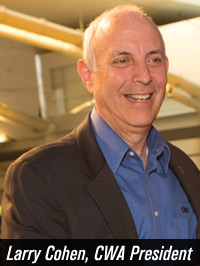Search News
For the Media
For media inquiries, call CWA Communications at 202-434-1168 or email comms@cwa-union.org. To read about CWA Members, Leadership or Industries, visit our About page.
Also in Winter 2013
- The Time is NOW for Immigration Reform
- Democracy that Works for All of Us: The Democracy Initiative
- Senate Rules: How We Got It Done
- CWA, Coalition Help Restore Democracy to U.S. Senate
- Behind Closed Doors
- An Explosion of Fracking: One of the Dirtiest Secrets of the TPP
- TPP: Just the Facts
- Say No to TPP Fast Track: A Fight We Can Win
- SHIPPING OUR JOBS OFFSHORE
- When It Comes to the TPP, What You Don't Know Will Hurt You
Working Together: Getting it Done

We have a victory to celebrate. All of us in CWA should be proud of the work our union did, with our allies, to help restore democracy to the U.S. Senate. The procedural change that Senators adopted last month means that, finally, President Obama’s nominations to executive branch positions and the judiciary (with the exception of the Supreme Court) will get the up-or-down vote they deserve.
That’s what the U.S. Constitution calls for, in Article II, Section 2, Clause 2, which clearly states that the Senate’s obligation of advice and consent is based on majority support, not a 60-vote super majority.
Now, President Obama can fulfill his constitutional obligation to nominate judges and administrators to carry out his programs. Far more than any other president, President Obama’s nominations have been blocked by a Republican majority not because of the merits of those individuals, but because of the Republican obstructionism and purposeful gridlock. Just seven of President George W. Bush’s executive nominations were blocked; so far, 83 of President Obama’s nominations have been blocked. There are at least 100 executive nominations still waiting for their confirmation vote, as well as 93 additional judicial vacancies. Now, at least, those have an opportunity to move forward to an up-or-down vote.
We need real filibuster reform that requires senators to take the Senate floor and debate legislation. That will require organizing for more fundamental rules reform in January 2015 when the new Congress begins.
In this issue, we focus on the Trans-Pacific Partnership. CWA and our allies are working to spread the word that “what you don’t know will hurt you.”
Over the past three years, negotiators from 12 countries have met mainly in secret, to put together a massive trade deal that is bad news for U.S. workers and consumers. About 600 corporate advisors from the biggest multinational corporations are at the table, but unions, the public, in fact, most members of Congress are shut out of the process.
Instead of trade policy that will benefit and improve the lives of 350 million Americans, for the past 20 years, our government has pursued trade deals that allow so-called national security interests to trump those of American working families. TPP follows that pattern.
That’s why there’s such a big push to have the Vietnam government included in TPP, from policy makers and corporations alike. Vietnam pays workers about 28 cents an hour, working conditions are repressive and environmental standards non-existent. U.S. corporations are very eager to set up shop there; earlier this year, General Electric and Procter & Gamble told the Vietnamese government that they planned to expand operations in Vietnam. UPS said it appreciated the Vietnamese government allowing the company to set up its business there.
It’s shameful that our nation is negotiating to enter into a complicated trade deal with yet another government that suppresses its people’s basic worker and human rights. And it’s equally shameful that there is no focus on U.S. working families. It’s no wonder negotiators don’t want to talk about what’s in TPP. As Senator Elizabeth Warren (D-Mass) said, “I have heard the argument that transparency would undermine the U.S. Trade Representative’s policy to complete the trade agreement because public opposition would be significant. In other words, if people knew what was going on, they would stop it.”
We are building a coalition to stop fast track, also called Trade Promotion Authority, that would prevent members of the House or Senate from making any amendments to TPP. This is a fight we can win.